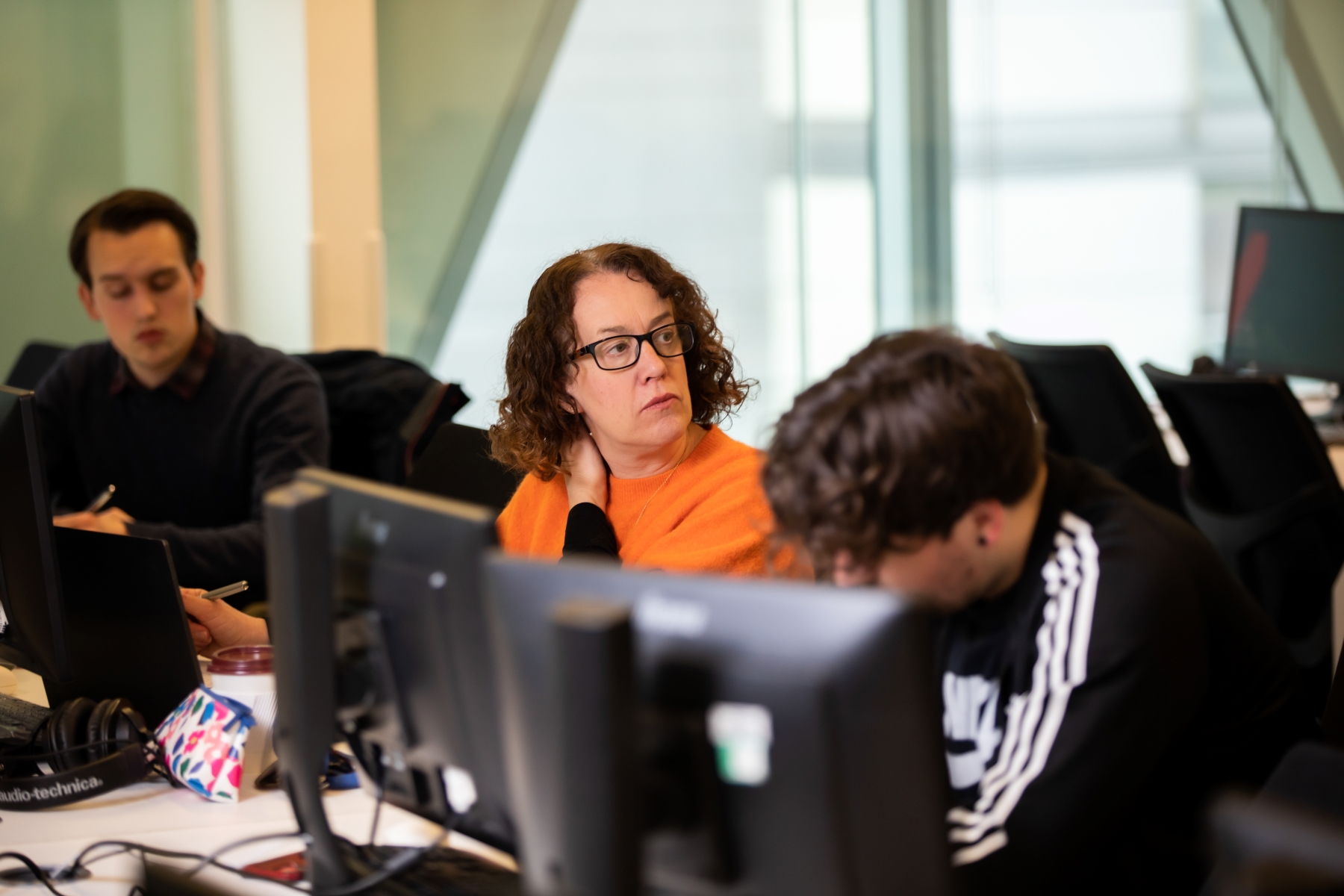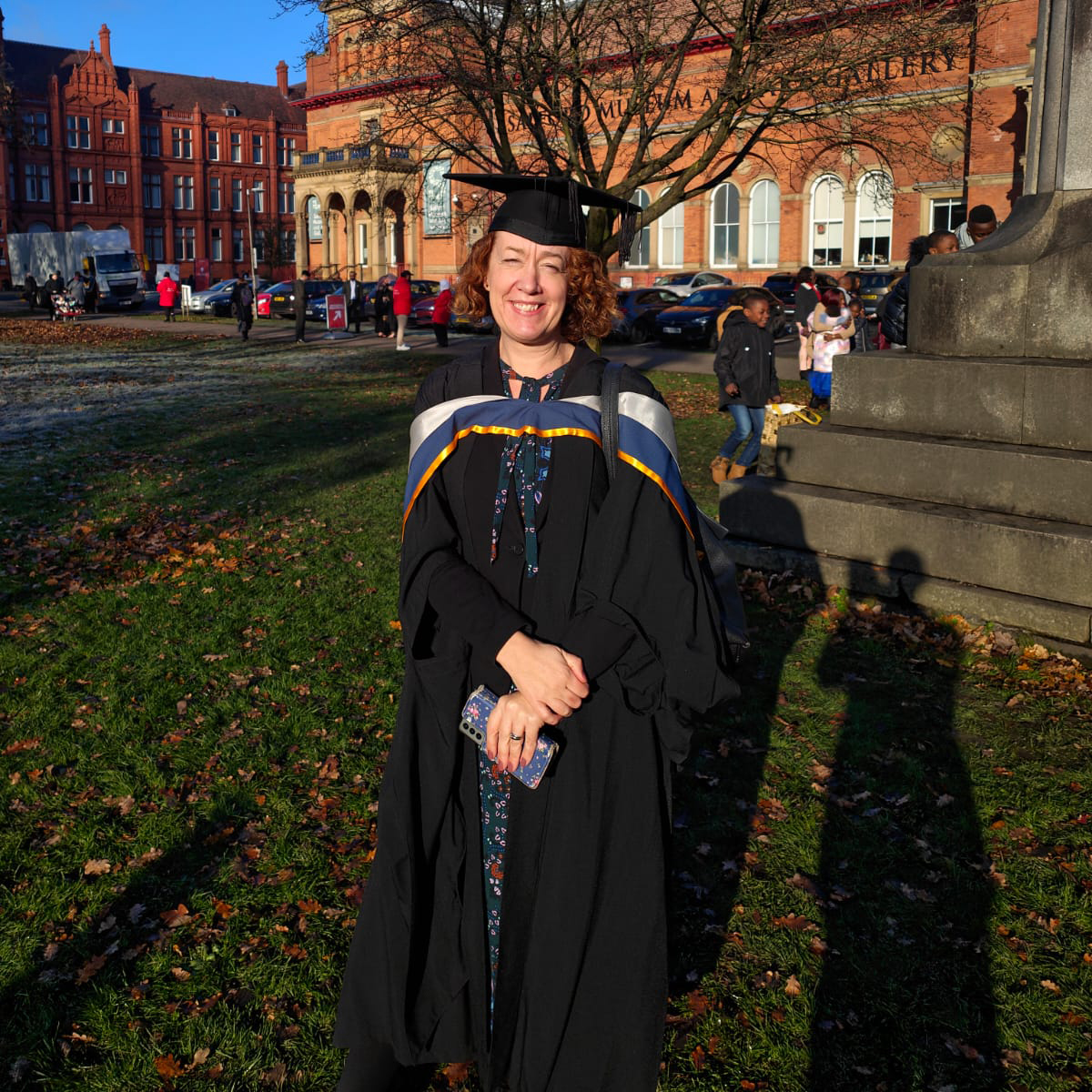Media Psychology
Full-time
Part-time
One year
Three year
September 2025
In a nutshell
International applicants: please check the international intakes page for the latest information and application dates.
This is the only dedicated postgraduate course in the UK focusing on the relationships between media and psychology from both academic and professional perspectives.
The course is taught at our state-of-the-art campus at MediaCity - the heart of the region's creative and digital industry.
Meet graduate and researcher Erica
Meet Erica Boardman, a graduate and research assistant within our vibrant psychology community. Read her story to find out more about her time at the University of Salford, highlights from the course, and her advice for future students: read Erica's story.
You will:
- Explore the psychological effects of media, how media use can be researched and evaluated and how to communicate with different audiences across different media.
- Develop a unique professional profile, applying psychology to understand, develop and predict people's interaction with media.
students accepted
01
04
This is for you if...
You are curious about the effects of media upon the individual and society.
You want to pursue a career in the communications professions or media research.
You want to learn at MediaCity with a multi-disciplinary team.
All about the course
This course will allow you to study the effects of media upon the individual and society, and how psychology can be applied to enhance media design and understand media consumption. In doing so you will also discuss issues of ethics, accessibility, understanding diverse audiences, positive uses of media and professional applications.
Join a unique learning environment, where you will interact with a multi-disciplinary team of experts in psychology, media and digital experience design.
If you want to pursue a career in the communications professions or media research, this course will provide you with a unique set of relevant skills.
The full course runs full-time over one year or three years part-time, giving you the chance to exit with the following awards:
Full-time
- Postgraduate Certificate: two modules over four months
- Postgraduate Diploma: four modules over eight months
- MSc: four modules plus a dissertation over one year
Part-time
- Postgraduate Certificate: two modules over nine months
- Postgraduate Diploma: four modules over two years
- MSc: four modules plus a dissertation over three years
Got a question?
If you have any questions or queries regarding the programme or programme admission, please contact our programme team using the details further down this page.
Follow the Media Psychology team on X (formerly Twitter): @UKMediaPsych
Issues in Media Psychology
In this module, you will develop the critical skills to analyse audiences and their media behaviours, gain a systematic understanding of research on the effects of media consumption, understand the use of psychology within media industries and explore issues of ethics and responsibility.
Media Psychology Research Methods
In this module, you are going to develop a toolbox for research in media psychology. In particular, you will learn different methods that can help find answers to questions concerning peoples’ experience when interacting with media.
Psychology of Media Communications
You will learn to apply psychology to understand media communication, persuasion and behaviour change. And to develop effective communication strategies.
The Psychology of Digital Experiences
You will gain a comprehensive understanding of the psychological factors involved in usable, accessible and inclusive designs in technology and work on a design brief to develop skills in human-centred design and user research.
Dissertation
The dissertation module is your opportunity to further investigate an aspect of this course through systematic literature review or research project.
Please note that it may not be possible to deliver the full list of options every year as this will depend on factors such as how many students choose a particular option. Exact modules may also vary in order to keep content current. When accepting your offer of a place to study on this programme, you should be aware that not all optional modules will be running each year. Your tutor will be able to advise you as to the available options on or before the start of the programme. Whilst the University tries to ensure that you are able to undertake your preferred options, it cannot guarantee this.
The School of Health and Society
The School of Health and Society is focused on enhancing the health and wellbeing of patients, service users and athletes and our commitment to public involvement help us retain our strong focus on real-world issues. The school is home to a dedicated Psychology Laboratory.
The Media Psychology course is delivered at our state-of-the-art MediaCity campus so you will be right at the heart of the Northern creative industry. Based at Salford Quays, you will have access to some of the best facilities in the world for digital and media research.
Our facilities
Psychology Laboratories
We provide a comfortable and friendly environment for you to carry out a wide range of research and testing. Our eleven labs include interview spaces, cognitive testing suites, and various specialist labs, all featuring the latest advanced experimental software for online and lab-based data collection. This setup allows us to take an integrated approach across the following areas of psychological interest:
- An eye tracker laboratory using the Tobii x50 eye tracker to monitor conscious and unconscious gaze movements.
- An observation suite with a two-way mirror.
- A video game analysis laboratory for studying the psychological and physiological effects of violent video games.
- A dedicated computer suite with access to a range of psychological programs such as ERTSLab and E-Prime.
Programme tutors
Meet our programme team below. If you have any questions or queries regarding the programme or programme admission, please contact the relevant tutors below:
- Programme enquiries: Dr Sharon Coen, Programme Leader - s.coen@salford.ac.uk
- Admissions enquiries: Dr Adam Galpin, Admissions Tutor - a.j.galpin@salford.ac.uk
Dr Sharon Coen
Reader/Associate Professor in Media Psychology
Sharon is an internationally recognised scholar with research and teaching experience in the areas of social and media psychology. Her main interests concern the ways the media portrays and responds to, social and political issues, and how this informs public perception.
Dr Adam Galpin
Senior Lecturer
Adam is a highly experienced lecturer and researcher, and regularly provides consultancy to the media industries regarding the psychology of audience needs. His research interests include media use in children and families and applying Psychology to the design of interactive technologies.
Learn more and view Sharon and Adam's publication lists via their staff profiles.
What about after uni?
This master's programme has been designed to meet the growing need for graduates with an advanced knowledge and skill set to understand the relationship between psychology and the media.
With this qualification, you could pursue a career in psychological consulting within media industries, social media management, user experience research and design, advertising, public relations, marketing, media analysis, media research and development, and academia.
Career Links
This course will involve a number of guest speakers from media industries and you will benefit from the close proximity to major media organisations at MediaCity.
What you need to know
The course is multi-disciplinary, combining psychological theory with social sciences, media and communication studies. We welcome students from these disciplines who have an interest in understanding the application of psychology to media provision and consumption. We also invite applications from those who have experience in psychology and research methods through work or study who will be considered in line with our Accreditation of Prior Learning procedure.
English language requirements
If you are an international student and not from a majority English-speaking country, you will need IELTS 6.5 with no element below 5.5. We also accept a range of other English language qualifications. If you do not have the English language requirements, you could take our Pre-Sessional English course.
Undergraduate degree
Normally an upper-second-class (2:1) honours degree in psychology, media studies or social sciences.
International Students
We accept qualifications from all around the world. Find your country to see a full list of entry requirements.
Accreditation of Prior Learning (APL)
We welcome applications from students who may not have formal/traditional entry criteria but who have relevant experience or the ability to pursue the course successfully.
The Accreditation of Prior Learning (APL) process could help you to make your work and life experience count. The APL process can be used for entry onto courses or to give you exemptions from parts of your course.
Two forms of APL may be used for entry: the Accreditation of Prior Certificated Learning (APCL) or the Accreditation of Prior Experiential Learning (APEL).
How much?
| Type of study | Year | Fees |
|---|---|---|
| Full-time home | 2025/26 | £9,100 per year |
| Full-time international | 2025/26 | £17,000 per year |
| Part-time | 2025/26 | Part-time costs will be calculated on a pro rata basis. |
Additional costs
You should also consider further costs which may include books, stationery, printing, binding and general subsistence on trips and visits.
Scholarships for international students
If you are a high-achieving international student, you may be eligible for one of our scholarships. Explore our International Scholarships.
All set? Let's apply
Programme enquiries
If you have any questions or queries regarding the programme or programme admission, please contact the relevant tutors below:
- Programme enquiries: Dr Sharon Coen, Programme Leader - s.coen@salford.ac.uk
- Admissions enquiries: Dr Adam Galpin, Admissions Tutor - a.j.galpin@salford.ac.uk
General enquiries
Register for one of our Open Days, or contact our course enquiries team:



